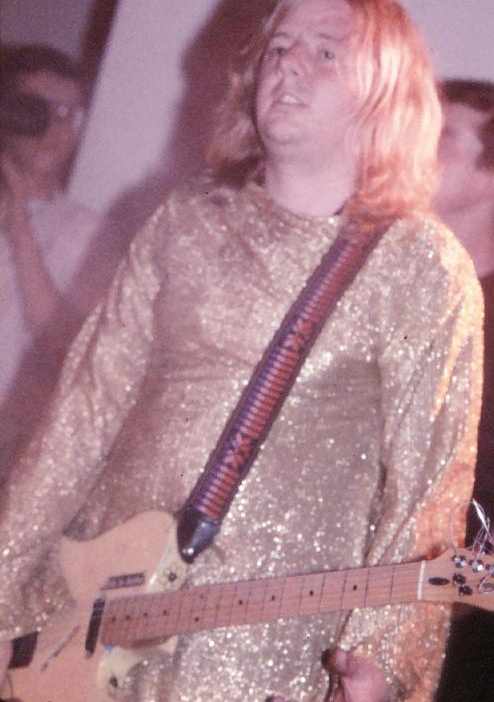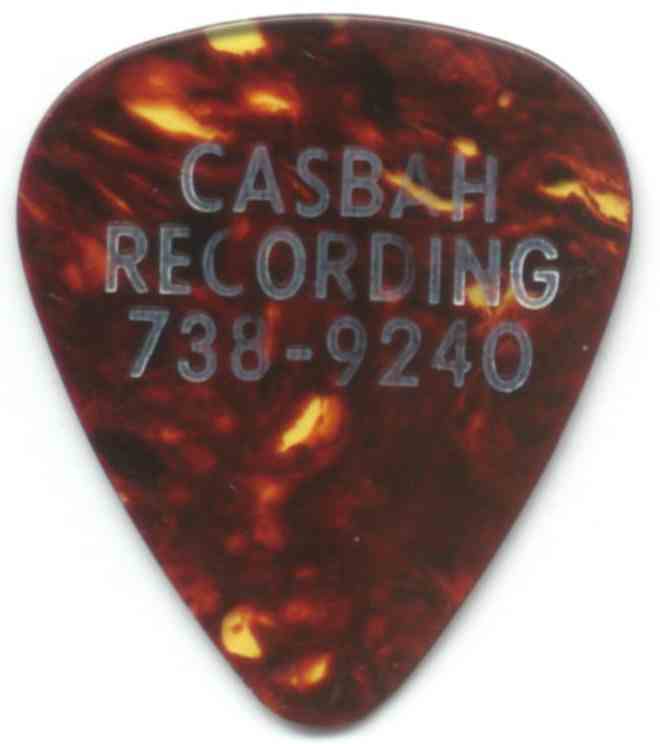
photo courtesy of Mr. Rhumba (c)2001
and The Green Room Factor
By Todd Brown.
Duraluxe guitar player Chris Colbert is something of a legend in the Christian alt rock world. Take away his influence as a writer and player with ground breaking acts Breakfast With Amy, Fluffy and Duraluxe, and the influence his had on the hundreds of records he’s recorded within the CCM world and you can be certain that the musical makeup of the Christian world would be significantly different. It says something then, that despite his enormous influence Colbert is still generally an outsider to the scene he helped to shape. At times pushed away by the industry, at times holding it at arms length, Colbert has always existed on the fringes. We recently had the chance to speak with the guitarist / producer / engineer about the state of his own band, the passing of longtime friend Gene Eugene and the Christian industry in general.
Todd Brown: Describe the current Duraluxe line up. Are you the only one still left from the Fluffy days?
Chris Colbert: Duraluxe is myself, Troy Daugherty (formerly with Hoi Polloi), Mark Emge, and Jason 71 who joined us after we lost our bassist Tommy Wedge to the hipsters of Athens. We're all in various stages of moving to L.A. right now, so we're a tad bit disorganized. I do believe a margin of chaos adds greatly to the creative process. That’s why I move every other year, I reckon. It does make a steady band line-up a challenge.
I can't even find any of the original Fluffies. Nathan was living in a van in Berkeley, Paul was living in Bolivia, Beans was teaching high school somewhere. It just seemed easier to start a whole new band- A lot easier.
TB: Your sound shifted pretty dramatically with Sugar Pistol ... was that a conscious choice or a natural development? Can we expect the Duraluxe sound to keep evolving?
CC: Sugar Pistol was a confusing time. I was couch surfing in Nashville and Fluffy had sorta fizzled out, but Flying Tart gave me five thousand dollars for a Fluffy record. Hey-ho, let's go. I just grabbed anyone around and recorded some jive. I was starting to dig on more lo-fi experimental stuff, like Guided by Voices or the Olivia Tremor Control. I was also recording Joe Christmas and Luxury and Morella's Forest around then.
I was really disappointed that it was released as Duraluxe instead of Fluffy and that Platinum Records thought that the title ‘Sugar Pistol' was offensive. Whatever. It was a Fluffy thing. I was already kickin' around the Duraluxe concept, and they used the name. Lame.
A couple years later they gave us money for a Duraluxe project and we turned in a record called 'Shady Mess'. A beautiful, weird record. They hated it. They said it had no commercial appeal. At this point I gave up on the Christian market altogether.

photo courtesy of Mr. Rhumba (c)2001
TB: Have you felt stifled in the Christian industry?
CC: I gave up on the Christian music scene for a while mostly because I find it a lot more corporate than the general market. We’re making records to make Christian bookstore buyers happy. They're usually not the most open-minded lot in life. I guess Christian music should only be worship music, but this market doesn't see it that way. They will sell whatever they think will move a lot of records. Cash flow. Marketing the death and resurrection of Jesus Christ.
I still 'rassle with the whole notion of what Christian music is and what it is supposed to be. I guess that's why I'm ultimately more comfortable working in the general market. It's simple, gimme money and I'll help you make a great record. Christian music is inherently different. There is a moral and spiritual agenda, and sometimes the agenda differs greatly with what I find to be true. I take God seriously, and I don't believe a lot of people in Christian music have thought their belief systems through. I feel partly responsible if I work on a record that is chock full of religious misinformation, or dogmatic propaganda. I do respect a lot of these people in this market. I trust them. Terry Taylor or Cush, people like that keep me in it.
TB: I've heard that you're taking over the Green Room ... is that the case and if so is it difficult / imposing to step into Gene Eugene's shoes so soon after his passing?
CC: When I got the call that Gene had passed away, I was on a plane headed for the Green Room. It has been my second home since Gene and Anna bought it. There is no way to ever fill Gene's shoes. I don't even try. I was asked to stay and help out, finishing all of Gene's projects. I know the studio better than anyone, except Gene, so it seemed to be a natural choice for me to stick around. Gene was my friend, and when a friend of mine is in trouble, I do what I can.
I think keeping the Green Room going is the best tribute myself and the great talents that work here can give him.
It still feels strange at the Green Room sometimes. I can be sitting at the console working away on some record when somebody will open the door to peek in. Every now and again for a second I expect to see Gene. When I worked here before he would crack the door and tell me to find an excuse to wrap up the session so we could go out, usually a movie. y2k man, it happened.
TB: How's the songwriting process work in the band? Have you found it difficult working with such a steadily changing cast of players?
CC: This year alone I have worked on about twenty records. Every day I wake up and work on songs with different players, in different styles. What I love about making music is the collaboration. Writing by myself is weak. It isn't music unless it's a party. I find it a lot more fun to work with certain styles, I mean I have more 'indie credibility' than I will ever need. I hate formula and rules. I have some pretty serious authority issues, so I prefer to work with people who are freethinkers, willing to try something new, and not ruled by fear.
I feel most comfortable writing with a pretty small group of people, though. Troy and I are my favorite combo, then the Lassie Foundation, and Hindalong and Tess Wiley. I kinda use the same language musically with these people.
The engineer-producer role is a little different. I think the way I record is a bit more heavy handed than most engineers. It doesn't matter who or what I'm recording, I will probably have more influence on it than the artist usually expects from an engineer. I feel my job is to define the song, regardless of anything else. I don't care who is paying me, I work for the song itself, even if the song wants to go someplace the artist doesn't. The bands can be wrong. It surprises me that a lot of bands have no idea what it is about themselves that makes them cool. When people ask me what it is I do on these records I tell them I turn the knobs until it sounds cool. That’s the trick, you see. Any monkey can pull this jive.
TB: Would it be fair to call you an absurdist?
CC: Absurdist? Hell yeah, I am an absurdist.
The Australian aborigines spend two hours of their day providing what they need to live. They have twenty two hours to hang out, sleep, be creative, and focus on the transcendent qualities of existence. How can these people be any closer to God? I work twelve to fourteen hours a day making music to be encoded on shiny plastic discs that can be listened to by people willing to shell out ten or fifteen dollars. Strangers. People I don't know. I run up five hundred dollars a month in electricity bills. I get paid to give my opinion on other people’s art then I record it with a bunch of gadgets that cost more than a nice house. Sometimes I drive around in a van for weeks at a time playing rock and roll for money. Very little money. My life is absurd to the core. I used to think I was a dadaist, back in the Breakfast With Amy days, but things have become stranger since then.
I was standing in line at a Starbucks, ready to pay four bucks for coffee, yesterday. There were seven people in line in front of me. Four of them were talking on cell phones. Four out of seven. Babbling nonsense into these hi-tech walkie-talkies. If the aborigine was there with me, what kind of fools would we appear to be to him? I kinda wonder if maybe the Unabomber was on to something. Our absurd civilization, doing it's damndest to become an empire, bowing down to the god of technology, technology junkies. At the same time there are people starving to death in this country. I guess it's absurd to think they should chuck their cell phones into a river and use that money to feed somebody.
I guess I'm saying we're all absurdists if we choose a lifestyle that sets nothing but distraction between your soul, yourself, your friends, and God.
